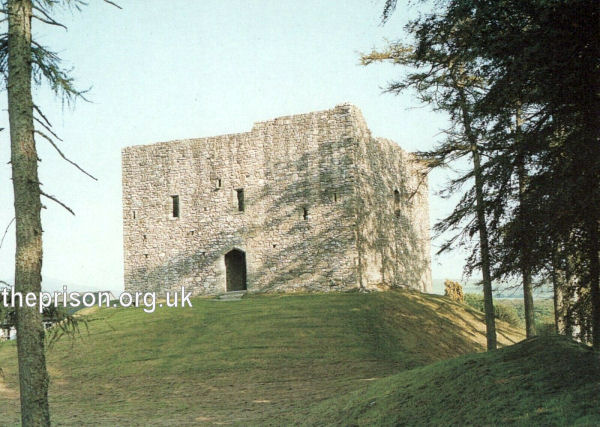Lydford Tower, Lydford, Devon
Lydford Tower (or Castle) dates from 1194, when King John authorised its construction at the east of the parish church. It was intended to house offenders against the forest and the stannary (tin industry) laws. The tin industry in Devon and Cornwall was of such significance that a special legal and taxation system had evolved to govern it, with the stannaries, or tin districts of Devon, being administered from Lydford. From 1239 to 1300, proprietorship of Lydford was granted to the Earl of Cornwall but the estate then reverted to the Crown, Since 1337, Dartmoor and Lydford Castle have been in the possession of the Duchy of Cornwall.
The tower was two storeys high and about 50 feet square, its walls being more than 10 feet thick and containing just a few narrow windows. It under some reconstruction in the late 13th century to increase its height. The interior of the original ground floor was filled in, blocking the original windows. There may have been apartments for the gaoler on the upper floor, with prison cells below, and the basement acting as a dungeon.

Lydford Tower, Lydford, Devon
Offenders against the stannary laws continued to be held at Lydford up until the 18th century, although by 1650 the castle was said to be 'very much in decay', with floors fallen in and only the roof intact. Repairs were carried out in the early 1700s but by the start of the 19th century the building was a near ruin.
The remains of the castle are now in the care of English Heritage.
Records
Note: many repositories impose a closure period of up to 100 years for records identifying individuals. Before travelling a long distance, always check that the records you want to consult will be available.
- No individual records identified for this establishment — any information welcome.
- The National Archives, Kew, Richmond, Surrey, TW9 4DU. Has a wide variety of crime and prison records going back to the 1770s, including calendars of prisoners, prison registers and criminal registers.
- Find My Past has digitized many of the National Archives' prison records, including prisoner-of-war records, plus a variety of local records including Manchester, York and Plymouth. More information.
- Prison-related records on
Ancestry UK
include Prison Commission Records, 1770-1951
, and local records from London, Swansea, Gloucesterhire and West Yorkshire. More information.
- The Genealogist also has a number of National Archives' prison records. More information.
Bibliography
- Higginbotham, Peter The Prison Cookbook: A History of the English Prison and its Food (2010, The History Press)
- Brodie, A. Behind Bars - The Hidden Architecture of England's Prisons (2000, English Heritage)
- Brodie, A., Croom, J. & Davies, J.O. English Prisons: An Architectural History (2002, English Heritage)
- Harding, C., Hines, B., Ireland, R., Rawlings, P. Imprisonment in England and Wales (1985, Croom Helm)
- McConville, Sean A History of English Prison Administration: Volume I 1750-1877 (1981, Routledge & Kegan Paul)
- Morris, N. and Rothman, D.G. (eds.) The Oxfod History of the Prison (1997, OUP)
- Pugh R.B. Imprisonment in Medieval England (1968, CUP)
Links
- English Heritage web page for Lydford Castle.
- Prison Oracle - resources those involved in present-day UK prisons.
- GOV.UK - UK Government's information on sentencing, probation and support for families.
Except where indicated, this page () © Peter Higginbotham. Contents may not be reproduced without permission.



